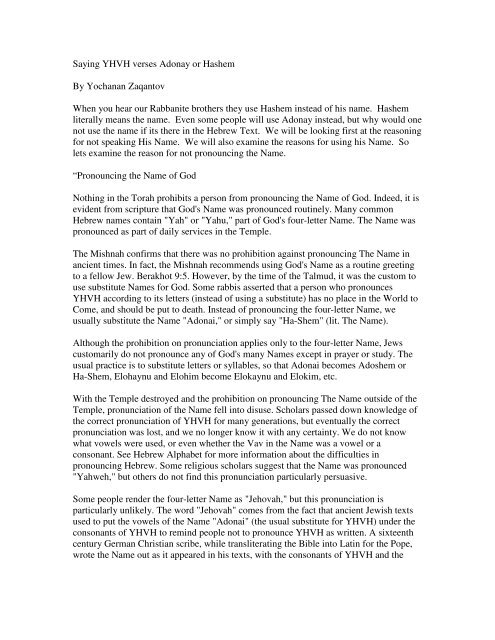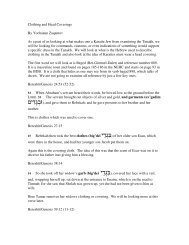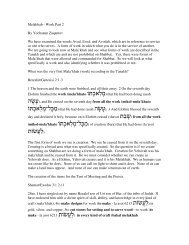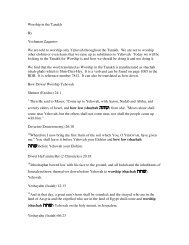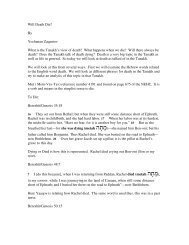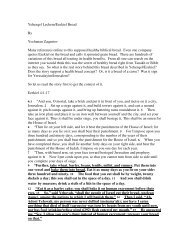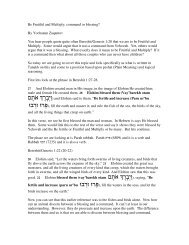Saying YHVH verses Adonay or Hashem By ... - Karaite Judaism
Saying YHVH verses Adonay or Hashem By ... - Karaite Judaism
Saying YHVH verses Adonay or Hashem By ... - Karaite Judaism
You also want an ePaper? Increase the reach of your titles
YUMPU automatically turns print PDFs into web optimized ePapers that Google loves.
<strong>Saying</strong> <strong>YHVH</strong> <strong>verses</strong> <strong>Adonay</strong> <strong>or</strong> <strong>Hashem</strong><br />
<strong>By</strong> Yochanan Zaqantov<br />
When you hear our Rabbanite brothers they use <strong>Hashem</strong> instead of his name. <strong>Hashem</strong><br />
literally means the name. Even some people will use <strong>Adonay</strong> instead, but why would one<br />
not use the name if its there in the Hebrew Text. We will be looking first at the reasoning<br />
f<strong>or</strong> not speaking His Name. We will also examine the reasons f<strong>or</strong> using his Name. So<br />
lets examine the reason f<strong>or</strong> not pronouncing the Name.<br />
“Pronouncing the Name of God<br />
Nothing in the T<strong>or</strong>ah prohibits a person from pronouncing the Name of God. Indeed, it is<br />
evident from scripture that God's Name was pronounced routinely. Many common<br />
Hebrew names contain "Yah" <strong>or</strong> "Yahu," part of God's four-letter Name. The Name was<br />
pronounced as part of daily services in the Temple.<br />
The Mishnah confirms that there was no prohibition against pronouncing The Name in<br />
ancient times. In fact, the Mishnah recommends using God's Name as a routine greeting<br />
to a fellow Jew. Berakhot 9:5. However, by the time of the Talmud, it was the custom to<br />
use substitute Names f<strong>or</strong> God. Some rabbis asserted that a person who pronounces<br />
<strong>YHVH</strong> acc<strong>or</strong>ding to its letters (instead of using a substitute) has no place in the W<strong>or</strong>ld to<br />
Come, and should be put to death. Instead of pronouncing the four-letter Name, we<br />
usually substitute the Name "Adonai," <strong>or</strong> simply say "Ha-Shem" (lit. The Name).<br />
Although the prohibition on pronunciation applies only to the four-letter Name, Jews<br />
customarily do not pronounce any of God's many Names except in prayer <strong>or</strong> study. The<br />
usual practice is to substitute letters <strong>or</strong> syllables, so that Adonai becomes Adoshem <strong>or</strong><br />
Ha-Shem, Elohaynu and Elohim become Elokaynu and Elokim, etc.<br />
With the Temple destroyed and the prohibition on pronouncing The Name outside of the<br />
Temple, pronunciation of the Name fell into disuse. Scholars passed down knowledge of<br />
the c<strong>or</strong>rect pronunciation of <strong>YHVH</strong> f<strong>or</strong> many generations, but eventually the c<strong>or</strong>rect<br />
pronunciation was lost, and we no longer know it with any certainty. We do not know<br />
what vowels were used, <strong>or</strong> even whether the Vav in the Name was a vowel <strong>or</strong> a<br />
consonant. See Hebrew Alphabet f<strong>or</strong> m<strong>or</strong>e inf<strong>or</strong>mation about the difficulties in<br />
pronouncing Hebrew. Some religious scholars suggest that the Name was pronounced<br />
"Yahweh," but others do not find this pronunciation particularly persuasive.<br />
Some people render the four-letter Name as "Jehovah," but this pronunciation is<br />
particularly unlikely. The w<strong>or</strong>d "Jehovah" comes from the fact that ancient Jewish texts<br />
used to put the vowels of the Name "Adonai" (the usual substitute f<strong>or</strong> <strong>YHVH</strong>) under the<br />
consonants of <strong>YHVH</strong> to remind people not to pronounce <strong>YHVH</strong> as written. A sixteenth<br />
century German Christian scribe, while transliterating the Bible into Latin f<strong>or</strong> the Pope,<br />
wrote the Name out as it appeared in his texts, with the consonants of <strong>YHVH</strong> and the
vowels of Adonai, and came up with the w<strong>or</strong>d JeHoVaH, and the name stuck.”<br />
http://www.jewfaq.<strong>or</strong>g/name.htm<br />
So we see from this description that there indeed is no restriction in the Miqra f<strong>or</strong> saying<br />
the name. In fact, this website admits that Elohim’s name was used through out the<br />
Tanakh. The restriction was a man made rule. No only do they restrict the writing <strong>or</strong><br />
saying of the name but also some advocate that one substitute letters <strong>or</strong> some use hypen<br />
to block out letters of even the w<strong>or</strong>ds like God to be G-d. The claim is made that no one<br />
knows the Vowels that were used f<strong>or</strong> the name <strong>YHVH</strong>. We will examine that next.<br />
The point was made that the vowels used were f<strong>or</strong> <strong>YHVH</strong> were from Adonai. So let us<br />
examine the vowels<br />
Vowels<br />
chatef patach – holem -<br />
qames<br />
Translteration Hebrew W<strong>or</strong>d<br />
ָ ֲ<br />
ִ ֱ<br />
ֵ ֱ<br />
ָ ֱ<br />
Adonai <strong>or</strong> <strong>Adonay</strong> ינֹדא chatef-segol – holem - hireq Elohim םיהלֹא chatef-segol – holem - sere Elohei <strong>or</strong> Elohey יהלֹא chatef-segol – holem - qames Elohai <strong>or</strong> Elohay יהלֹא What we have above is the vowels f<strong>or</strong> other w<strong>or</strong>ds which vowels could be substituted f<strong>or</strong><br />
<strong>YHVH</strong> is this is true then one of there combinations should fit what is found in Tanakh.<br />
ָ<br />
ִ<br />
Vowels<br />
Seva – holem – qames<br />
Translteration<br />
Yehovah<br />
Hebrew W<strong>or</strong>d<br />
הוֹהְי chatef-segol – holem - hireq Yehovih הוֹהֱי The Hebrew w<strong>or</strong>d they claim uses the vowels of <strong>Adonay</strong> does not use the same vowels.<br />
The variation Yehovih which appears to use the same vowels as Elohim is translated as<br />
God just like Elohim. So we can see from these comparisons that indeed the substituted<br />
vowel the<strong>or</strong>y is not viable. Even the Article from <strong>Judaism</strong>101 states that people used<br />
Yeho, Yahu, and Yah as sh<strong>or</strong>tened versions of Yehovah. This shows us that indeed the<br />
name of Yehovah was used in common speech not just f<strong>or</strong> the Temple <strong>or</strong> Tent of<br />
Meeting.<br />
Rut/Ruth 2:4<br />
4 Presently Boaz arrived from Bethlehem. He greeted the reapers, “Yehovah be with<br />
you!” And they responded, “Yehovah bless you!”
In Hebrew, Boaz said to the reapers ם ֶכ ָמּ ִע הוֹהְי ָ Yehovah ‘Imekhem <strong>or</strong> Yehovah be<br />
with you all. The Reapers return the greeting to him and say הוֹהְי ָ ךָ ְכ רֶ ָבְ י<br />
Yevarekh’kha Yehovah <strong>or</strong> He bless you Yehovah. So we see that with this one example<br />
all the people here were just average Yisraelim and not Kohenim <strong>or</strong> Levi’im. So were<br />
does the idea come from that the Kohenim did the blessings. In Bamidbar, chapter 6.<br />
Bamidbar/Numbers 6:22-27<br />
22 Yehovah spoke to Moses: 23 Speak to Aaron and his sons: Thus shall you bless<br />
(Tevarakhu -They will bless them וּכרֲ ָבת) ְ the people of Israel. Say to them:<br />
24 Yehovah bless you and protect you! (Yevarekh’kha Yehovah veyish’merekha<br />
ךָרֶ ְמ ְשִׁי ו ְ הוֹהְי ָ ךָ ְכרֶ ָבְ י)<br />
25 Yehovah deal kindly and graciously with you! (ya’er Yehovah panayv eleykha<br />
viychunekha ָךּנֶּ חי ֻ ו ִ ךָי ֶלא ֵ וינָ ָפּ הוֹהְי ָ ראָי ֵ )<br />
26 Yehovah bestow His fav<strong>or</strong> upon you and grant you peace! (Yissa Yehovah panayv<br />
eleykha veyasem lekha shalom םוֹל ָשׁ ךָ ְל ם ֵשָׂי ו ְ ךָי ֶלא ֵ וינָ ָפּ הוֹהְי ָ א ָשִּׂי )<br />
27 Thus they shall link My name with the people of Israel, and I will bless them.<br />
Thus we see in first blessing part of the blessing given by the Reapers to Boaz. Thus,<br />
showing that using a blessing is not only f<strong>or</strong> the Priest but a average Yisraelim can bless<br />
too. The Name used in all three of these is Yehovah from <strong>YHVH</strong>. Thus, this was the<br />
name they were to use. We have seen so far that there is no restriction on the saying of<br />
the name so far.<br />
Vayiqra/Leviticus 24:10-16<br />
10 There came out among the Israelites one whose mother was Israelite and whose<br />
father was Egyptian. And a fight broke out in the camp between that half-Israelite and a<br />
certain Israelite. 11 The son of the Israelite woman pronounced (vayiqov – and he<br />
pierces בֹקִּיּ ו) ַ the Name in blasphemy (vayeqalel – and he cursed ל ֵלּקְי ַ ו), ַ and he<br />
was brought to Moses—now his mother’s name was Shelomith daughter of Dibri of the<br />
tribe of Dan—12 and he was placed in custody, until the decision of Yehovah should<br />
be made clear to them.<br />
13 And Yehovah spoke to Moses, saying: 14 Take the blasphemer (et-ham’qalel –<br />
the one from cursing ל ֵלּקַ ְמ ה־ת ַ א) ֶ outside the camp; and let all who were within<br />
hearing lay their hands upon his head, and let the whole community stone him.<br />
15 And to the Israelite people speak thus: Anyone who blasphemes (yeqalel – he<br />
curses ל ֵלּקְי) ַ Elohayv shall bear his guilt; 16 if he also pronounces (venoqev – and<br />
pierces בקֹנ ֵ ְ<br />
ו) the name Yehovah, he shall be put to death. The whole community shall
stone him; stranger <strong>or</strong> citizen, if he has thus pronounced (banaq’vo – in pierce him<br />
וֹב ְק נָ ְבּ) the Name, he shall be put to death.<br />
Vayiqov is the Qal future tense of Naqav a verse in the Qal simple which means to pierce<br />
<strong>or</strong> cause damage. Thus, this person was piercing at the Name to cause harm. It is<br />
reference number 5344. The next w<strong>or</strong>d is Vayeqalel, which is to condemn <strong>or</strong> lightly<br />
esteem. In another w<strong>or</strong>ds, he did not hold up Yehovah’s name in the awe it should be<br />
held. He despised Yehovah. This w<strong>or</strong>d is reference number 7043. The w<strong>or</strong>d most used<br />
f<strong>or</strong> when a person speaks is Amar ( רמא 559) <strong>or</strong> sometimes Davar ( רבד 1696). Here we<br />
seen different w<strong>or</strong>ds used but again because of the translat<strong>or</strong>’s agenda we have a text in<br />
English, which perpetuates a man made rule of no pronouncing.<br />
So let us look at some of the ways Yehovah’s name is used.<br />
We see we are to swear by his name.<br />
Devarim/Deuteronomy 6:14<br />
13 Revere only Yehovah Eloheykha ( ךָיהלֹ ֶ א ֱ הוהְי ָ ) and w<strong>or</strong>ship Him alone, and<br />
swear only by His name.<br />
Here we see that one must swear by his name. Thus, one must speak it to swear by it.<br />
Devarim/Deuteronomy 10:20<br />
20 You must revere Yehovah Eloheykha ( ךָיהלֹ ֶ א ֱ הוהְי ָ ): only Him shall you<br />
w<strong>or</strong>ship, to Him shall you hold fast, and by His name shall you swear.<br />
Again, if we must swear by his name then we must speak his name.<br />
Yermiyahu/Jeremiah 4:1-2<br />
1 If you return, O Israel —declares Yehovah (הוהְי)— ָ If you return to Me, If you<br />
remove your abominations from My presence And do not waver, 2 And swear, “As<br />
Yehovah lives (Chai Yehiovah הוהְי־י ָ ח),” ַ In sincerity, justice, and righteousness—<br />
Nations shall bless themselves by you And praise themselves by you.<br />
Swearing by his name in sincerity, justice and righteousness is part of returning to him.<br />
If we never use his name in swearing <strong>or</strong> taking oaths are we fully returning to him?<br />
Taken in Oaths<br />
Melekhim Aleph/I Kings 1:29-30
29 And the king took an oath, saying, “As Yehovah lives (Chai Yehovah הוהְי־י ָ חַ<br />
), who has rescued me from every trouble: 30 The oath I sw<strong>or</strong>e to you by the LORD,<br />
the God (baYehovah Elohey יהלֹ ֵ א ֱ הוהי ָ בַּ<br />
) of Israel, that your son Solomon should<br />
succeed me as king and that he should sit upon my throne in my stead, I will fulfill this<br />
very day!”<br />
Melekh David made an oath and in doing so use Chai Yehovah <strong>or</strong> As Yehovah lives<br />
which is swearing by his name.<br />
Melekhim Aleph/I Kings 17:1<br />
1 Elijah the Tishbite, an inhabitant of Gilead, said to Ahab, “As Yehovah lives (Chai<br />
Yehovah הוהְי־י ָ ַ<br />
except at my bidding.”<br />
ח), Elohey of Israel whom I serve, there will be no dew <strong>or</strong> rain<br />
Here Eliyahu is making an oath also and using Chai Yehovah too.<br />
Melekhim Bet/II Kings 2:2<br />
2 Elijah said to Elisha, “Stay here, f<strong>or</strong> Yehovah (הוהְי) ָ has sent me on to Bethel.”<br />
“As Yehovah lives and as you live (chai Yehovah veChei naf’shekha<br />
ךָ ְשׁ ְפ ַנ־יחֵ ו ְ הוהְי־י ָ חַ<br />
),” said Elisha, “I will not leave you.” So they went down to<br />
Bethel.<br />
Here Elisha makes an oath by Yehovah and Eliyahu lives that he will not leave Eliyahu.<br />
Yermiyahu/Jeremiah 12:14-16<br />
14 Thus said Yehovah (הוהְי): ָ As f<strong>or</strong> My wicked neighb<strong>or</strong>s who encroach on the<br />
heritage that I gave to My people Israel—I am going to uproot them from their soil, and I<br />
will uproot the House of Judah out of the midst of them. 15 Then, after I have uprooted<br />
them, I will take them back into fav<strong>or</strong>, and rest<strong>or</strong>e them each to his own inheritance and<br />
his own land. 16 And if they learn the ways of My people, to swear by My name—“As<br />
Yehovah lives (Chai Yehovah ה ָ<br />
והְי־י ַ<br />
ח)”—just as they once taught My people to<br />
swear by Baal, then they shall be built up in the midst of My people.<br />
Here we see that one of the things a person must learn to do be built up in the midst of his<br />
people is learn to swear by his name.<br />
Shemu’el Aleph/I Samuel 20:42
42 Jonathan said to David, “Go in peace! F<strong>or</strong> we two have sw<strong>or</strong>n to each other in the<br />
name of Yehovah (הוהְי): ָ ‘May Yehovah (הוהְי) ָ be [witness] between you and me,<br />
and between your offspring and mine, f<strong>or</strong>ever!’”<br />
Here Jonathan and David sw<strong>or</strong>e to each other by the name of Yehovah. You can see<br />
without going through every single reference in the Tanakh that there is ample proof that<br />
Yehovah’s name was used by the people and were required to swear by it.<br />
They called upon his Name:<br />
Bereshit/Genesis 4:26<br />
26 And to Seth, in turn, a son was b<strong>or</strong>n, and he named him Enosh. It was then that men<br />
began to invoke Yehovah by name (liq’ro bashem Yehovah ה ָ אֹ ר ְק ִל<br />
והְי ם ֵשׁ ְבּ ).<br />
Liq’ro is the infinitive f<strong>or</strong>m of Kara that is to call. Bashem is in name. This means that<br />
men called in name Yehovah in this time. They used his name at this time.<br />
Bereshit/Genesis 24:26-27, 35<br />
26 The man bowed low in homage to Yehovah (leYehovah הוהי ָ ַל) 27 and said,<br />
“Blessed be Yehovah (Barukh Yehovah הוהְי ָ ךְוּר ָבּ ), Elohey of my master<br />
Abraham, who has not withheld His steadfast faithfulness from my master. F<strong>or</strong> I have<br />
been guided on my errand by Yehovah (הוהְי), ָ to the house of my master’s kinsmen.”<br />
We see that the servant owned by Avraham was unafraid to use Yehovah’s name in<br />
speaking of the great thing in making his errand a success.<br />
35 “Yehovah (vaYehovah הוהי ָ ו) ַ has greatly blessed my master, and he has become<br />
rich: He has given him sheep and cattle, silver and gold, male and female slaves, camels<br />
and asses.<br />
Here the servant tells in n<strong>or</strong>mal speech how Yehovah had blessed his servant.<br />
Shemot/Exodus 3:13-18<br />
13 Moses said to HaElohim, “When I come to the Israelites and say to them ‘Elohey of<br />
your fathers has sent me to you,’ and they ask me, ‘What is His name?’ what shall I say<br />
to them?” 14 And Elohim said to Moses, “Ehyeh-Asher-Ehyeh
( הֶיהְ א ֶ ר ֶשׁ ֲ הֶיהְ אֶ<br />
(הֶיהְ ֶ<br />
א ).” He continued, “Thus shall you say to the Israelites, ‘Ehyeh<br />
א) sent me to you.’” 15 And Elohim said further to Moses, “Thus shall you<br />
speak to the Israelites: Yehovah (הוהְי), ָ Elohey of your fathers, Elohey of Abraham,<br />
Elohey of Isaac, and Elohey of Jacob, has sent me to you: This shall be My name f<strong>or</strong>ever,<br />
This My appellation f<strong>or</strong> all eternity.<br />
Many people confuse Eh’yeh as Yehovah’s name but he clearly says Yehovah and says<br />
this is his name. Eh’yeh is the Kal Future of Hayah that is a verb and reference number<br />
1961. This particular conjugation of the verb is one that uses the meaning “Shall be”<br />
The Aleph in the front as a prefix is generally used to say “I” Thus Eh’yah is “I shall be”<br />
and so he is saying Eh’yah asher Eh’yah <strong>or</strong> “I shall be which I shall be”<br />
16 “Go and assemble the elders of Israel and say to them: Yehovah (הוהְי), ָ Elohey of<br />
your fathers, Elohey of Abraham, Isaac, and Jacob, has appeared to me and said, ‘I have<br />
taken note of you and of what is being done to you in Egypt, 17 and I have declared: I<br />
will take you out of the misery of Egypt to the land of the Canaanites, the Hittites, the<br />
Am<strong>or</strong>ites, the Perizzites, the Hivites, and the Jebusites, to a land flowing with milk and<br />
honey.’ 18 They will listen to you; then you shall go with the elders of Israel to the<br />
king of Egypt and you shall say to him, ‘Yehovah (הוהְי), ָ Elohey of the Hebrews,<br />
manifested Himself to us. Now theref<strong>or</strong>e, let us go a distance of three days into the<br />
wilderness to sacrifice to Yehovah Eloheynu ( וּניהלֹ ֵ א ֱ הוהי ָ ַל ).’<br />
Moshe spoke Yehovah’s name to the Elders, the People and Pharaoh. Again if this was<br />
not a name to use then why was it used so much. One can’t say this was only f<strong>or</strong> prayer<br />
but in n<strong>or</strong>mal speech.<br />
Shemot/Exodus 5:1-3<br />
1 Afterward Moses and Aaron went and said to Pharaoh, “Thus says Yehovah (הוהְי ָ<br />
), Elohey of Israel: Let My people go that they may celebrate a festival f<strong>or</strong> Me in the<br />
wilderness.” 2 But Pharaoh said, “Who is Yehovah (הוהְי) ָ that I should heed Him<br />
and let Israel go? I do not know Yehovah (הוהְי), ָ n<strong>or</strong> will I let Israel go.” 3 They<br />
answered, “Elohey of the Hebrews has manifested Himself to us. Let us go, we pray, a<br />
distance of three days into the wilderness to sacrifice to Yehovah Eloheynu<br />
( וּניהלֹ ֵ א ֱ הוהי ָ ַל ), lest He strike us with pestilence <strong>or</strong> sw<strong>or</strong>d.”<br />
Again in all the discussions with Pharaoh they used his name and so did Pharaoh.<br />
Shemot/Exodus 14:12-14
12 Is this not the very thing we told you in Egypt, saying, ‘Let us be, and we will serve<br />
the Egyptians, f<strong>or</strong> it is better f<strong>or</strong> us to serve the Egyptians than to die in the wilderness’?”<br />
13 But Moses said to the people, “Have no fear! Stand by, and witness the deliverance<br />
which Yehovah (הוהְי) ָ will w<strong>or</strong>k f<strong>or</strong> you today; f<strong>or</strong> the Egyptians whom you see today<br />
you will never see again. 14 Yehovah (הוהְי) ָ will battle f<strong>or</strong> you; you hold your<br />
peace!”<br />
Moshe spoke to the people telling them what Yehovah would do.<br />
Shemot/Exodus 15:1-21<br />
1 Then Moses and the Israelites sang this song to Yehovah (ה ָ<br />
I will sing to Yehovah (הוהי ָ ַל), f<strong>or</strong> He has triumphed gl<strong>or</strong>iously;<br />
H<strong>or</strong>se and driver He has hurled into the sea.<br />
2 Yah (הָּי) is my strength and might;<br />
He is become my deliverance.<br />
This is Eli and I will enshrine Him;<br />
Elohey of my father, and I will exalt Him.<br />
3 Yehovah (הוהְי), ָ the Warri<strong>or</strong>—Yehovah (הוהְי) ָ is His name!<br />
4 Pharaoh’s chariots and his army<br />
He has cast into the sea;<br />
And the pick of his officers<br />
Are drowned in the Sea of Reeds.<br />
5 The deeps covered them;<br />
They went down into the depths like a stone.<br />
6 Your right hand, Yehovah (הוהְי), ָ gl<strong>or</strong>ious in power,<br />
Your right hand, Yehovah (הוהְי), ָ shatters the foe!<br />
7 In Your great triumph You break Your opponents;<br />
You send f<strong>or</strong>th Your fury, it consumes them like straw.<br />
8 At the blast of Your nostrils the waters piled up,<br />
The floods stood straight like a wall;<br />
The deeps froze in the heart of the sea.<br />
9 The foe said,<br />
“I will pursue, I will overtake,<br />
I will divide the spoil;<br />
My desire shall have its fill of them.<br />
I will bare my sw<strong>or</strong>d—<br />
My hand shall subdue them.”<br />
10 You made Your wind blow, the sea covered them;<br />
והי ַל ). They said:
They sank like lead in the majestic waters.<br />
11 Who is like You, Yehovah (הוהְי), ָ among the celestials;<br />
Who is like You, majestic in holiness,<br />
Awesome in splend<strong>or</strong>, w<strong>or</strong>king wonders!<br />
12 You put out Your right hand,<br />
The earth swallowed them.<br />
13 In Your love You lead the people You redeemed;<br />
In Your strength You guide them to Your holy abode.<br />
14 The peoples hear, they tremble;<br />
Agony grips the dwellers in Philistia.<br />
15 Now are the clans of Edom dismayed;<br />
The tribes of Moab—trembling grips them;<br />
All the dwellers in Canaan are aghast.<br />
16 Terr<strong>or</strong> and dread descend upon them;<br />
Through the might of Your arm they are still as stone—<br />
Till Your people cross over, Yehovah (הוהְי), ָ<br />
Till Your people cross whom You have ransomed.<br />
17 You will bring them and plant them in Your own mountain,<br />
The place You made to dwell in, Yehovah (הוהְי), ָ<br />
The sanctuary, <strong>Adonay</strong> (ינֹד ָ א), ֲ which Your hands established.<br />
18 Yehovah (הוהְי) ָ will reign f<strong>or</strong> ever and ever!<br />
19 F<strong>or</strong> the h<strong>or</strong>ses of Pharaoh, with his chariots and h<strong>or</strong>semen, went into the sea; and<br />
Yehovah (הוהְי) ָ turned back on them the waters of the sea; but the Israelites marched<br />
on dry ground in the midst of the sea.<br />
20 Then Miriam the prophetess, Aaron’s sister, took a timbrel in her hand, and all the<br />
women went out after her in dance with timbrels. 21 And Miriam chanted f<strong>or</strong> them:<br />
Sing to Yehovah (הוהי ָ ַל), f<strong>or</strong> He has triumphed gl<strong>or</strong>iously;<br />
H<strong>or</strong>se and driver He has hurled into the sea.<br />
You can see Yehovah is used here as well as Yah a sh<strong>or</strong>ten version of Yehovah’s name.<br />
Shemot/Exodus 20: whole chapter<br />
1 Elohim spoke all these w<strong>or</strong>ds, saying:<br />
2 I Yehovah am Eloheykha ( ךָיהלֹ ֶ א ֱ הוהְי ָ ) who brought you out of the land of<br />
Egypt, the house of bondage: 3 You shall have no elohim besides Me.<br />
4 You shall not make f<strong>or</strong> yourself a sculptured image, <strong>or</strong> any likeness of what is in the<br />
heavens above, <strong>or</strong> on the earth below, <strong>or</strong> in the waters under the earth. 5 You shall not<br />
bow down to them <strong>or</strong> serve them. F<strong>or</strong> I Yehovah Eloheykha ( ךָיהלֹ ֶ ֱ הוהְי ָ<br />
א ) am an<br />
impassioned [God], visiting the guilt of the parents upon the children, upon the third and
upon the fourth generations of those who reject Me, 6 but showing kindness to the<br />
thousandth generation of those who love Me and keep My commandments.<br />
7 You shall not swear falsely by the name of Yehovah Eloheykha ( ךָיהלֹ ֶ א ֱ הוהְי ָ );<br />
f<strong>or</strong> Yehovah (הוהְי) ָ will not clear one who swears falsely by His name.<br />
8 Remember the sabbath day and keep it holy. 9 Six days you shall lab<strong>or</strong> and do all<br />
your w<strong>or</strong>k, 10 but the seventh day is a sabbath of Yehovah Eloheykha ( הוהי ָ ַל<br />
ךָיהלֹ ֶ ֱ<br />
א): you shall not do any w<strong>or</strong>k—you, your son <strong>or</strong> daughter, your male <strong>or</strong> female<br />
slave, <strong>or</strong> your cattle, <strong>or</strong> the stranger who is within your settlements. 11 F<strong>or</strong> in six days<br />
Yehovah (הוהְי) ָ made heaven and earth and sea, and all that is in them, and He rested<br />
on the seventh day; theref<strong>or</strong>e Yehovah (הוהְי) ָ blessed the sabbath day and hallowed it.<br />
12 Hon<strong>or</strong> your father and your mother, that you may long endure on the land that<br />
Yehovah Eloheykha ( ךָיהלֹ ֶ א ֱ הוהְי ָ ) is assigning to you.<br />
13 You shall not murder.<br />
You shall not commit adultery.<br />
You shall not steal.<br />
You shall not bear false witness against your neighb<strong>or</strong>.<br />
14 You shall not covet your neighb<strong>or</strong>’s house: you shall not covet your neighb<strong>or</strong>’s<br />
wife, <strong>or</strong> his male <strong>or</strong> female slave, <strong>or</strong> his ox <strong>or</strong> his ass, <strong>or</strong> anything that is your neighb<strong>or</strong>’s.<br />
15 All the people witnessed the thunder and lightning, the blare of the h<strong>or</strong>n and the<br />
mountain smoking; and when the people saw it, they fell back and stood at a distance.<br />
16 “You speak to us,” they said to Moses, “and we will obey; but let not Elohim speak<br />
to us, lest we die.” 17 Moses answered the people, “Be not afraid; f<strong>or</strong> Elohim has come<br />
only in <strong>or</strong>der to test you, and in <strong>or</strong>der that the fear of Him may be ever with you, so that<br />
you do not go astray.” 18 So the people remained at a distance, while Moses<br />
approached the thick cloud where Elohim was.<br />
19 The LORD said (Vayomer – and He spoke ר ֶמאֹ יּו) ַ to Moses:<br />
Thus shall you say to the Israelites: You yourselves saw that I spoke to you from the very<br />
heavens: 20 With Me, theref<strong>or</strong>e, you shall not make any gods of silver, n<strong>or</strong> shall you<br />
make f<strong>or</strong> yourselves any gods of gold. 21 Make f<strong>or</strong> Me an altar of earth and sacrifice<br />
on it your burnt offerings and your sacrifices of well-being, your sheep and your oxen; in<br />
every place where I cause My name to be mentioned I will come to you and bless you.<br />
22 And if you make f<strong>or</strong> Me an altar of stones, do not build it of hewn stones; f<strong>or</strong> by<br />
wielding your tool upon them you have profaned them. 23 Do not ascend My altar by<br />
steps, that your nakedness may not be exposed upon it.<br />
The Yisraelim heard Yehovah Speak if there was to be a restriction put upon saying his<br />
name would not here be a good place f<strong>or</strong> it. It is very specific when not to use his name.<br />
That leads us into the next section.<br />
We are not to swear falsely by his name:
Shemot/Exodus 20:7<br />
7 You shall not swear falsely by the name of Yehovah Eloheykha ( ךָיהלֹ ֶ א ֱ הוהְי ָ );<br />
f<strong>or</strong> Yehovah (הוהְי) ָ will not clear one who swears falsely by His name.<br />
When we just read this one as part of the whole chapter this is what he says to not use his<br />
name f<strong>or</strong>. False swearing which also includes false witnessing. In saying an oath with<br />
his name we are making Yehovah our witness that what we say is true. If it is not true we<br />
swear falsely and thus false witness.<br />
Vayiqra/Leviticus 19:12<br />
12 You shall not swear falsely by My name, profaning the name of Eloheykha<br />
(vechillal’ta et Eloheykha) ךָיהלֹ ֶ א ֱ ם ֵשׁ־ת ֶא תָּ ְל ַלּחִ וְ<br />
): I am Yehovah (I<br />
Yehovah הוהְי ָ ינִ אֲ<br />
).<br />
How does one harm his name? Swear Falsely by it. In doing so we cause his name to be<br />
common in its used which is reflected in the use of the Hebrew w<strong>or</strong>d chalal which we<br />
know is to make something set-apart as common <strong>or</strong> every day.<br />
Devarim/Deuteronomy 5:11<br />
11 You shall not swear falsely by the name of Yehovah Eloheykha (lo tissa etshem-Yehovah<br />
Eloheykha ךָיהלֹ ֶ א ֱ הוהְי־ם ָ ֵשׁ־ת ֶא א ָשּׂ ת ִ אֹ ל);<br />
f<strong>or</strong> Yehovah (<br />
הוהְי) ָ will not clear one who swears falsely by His name.<br />
Here is the repeat of Shemot 20. Again Moshe repeats what we should not do with the<br />
name Yehovah.<br />
We can see that indeed the name Yehovah is used in the Tanakh over 5000 times. If this<br />
name was not to be spoken why have it listed so many times. Instead of Yehovah why<br />
does it not tell us to speak <strong>Hashem</strong> <strong>or</strong> <strong>Adonay</strong> instead? Chiefly, we have seen because he<br />
wants us to know him and his ways. We are commanded to swear by his name Yehovah.<br />
So where do they say <strong>Hashem</strong> came about and the restriction of the name?<br />
“The restriction upon communicating the Name proper probably <strong>or</strong>iginated in Oriental<br />
etiquette; in the East even a teacher was not called by name. F<strong>or</strong> naming his master<br />
Elisha, Gehazi was punished with leprosy (II Kings viii. 5; Sanh. 100a). After the death<br />
of the high priest Simeon the Righteous, f<strong>or</strong>ty years pri<strong>or</strong> to the destruction of the<br />
Temple, the priests ceased to pronounce the Name (Yoma39b). From that time the
pronunciation of the Name was prohibited. "Whoever pronounces the Name f<strong>or</strong>feits his<br />
p<strong>or</strong>tion in the future w<strong>or</strong>ld" (Sanh. xi. 1). Hananiah ben Teradion was punished f<strong>or</strong><br />
teaching his disciples the pronunciation of the Name ('Ab. Zarah 17b). It appears that a<br />
maj<strong>or</strong>ity of the priests in the last days of the Temple were unw<strong>or</strong>thy to pronounce the<br />
Name, and a combination of the letters <strong>or</strong> of the equivalents of the letters constituting the<br />
Name was employed by the priests in the Temple. Thus the Twelve-Lettered Name was<br />
substituted, which, a baraita says, was at first taught to every priest; but with the increase<br />
of the number of licentious priests the Name was revealed only to the pious ones, who<br />
"swallowed" its pronunciation while the other priests were chanting. Another<br />
combination, the F<strong>or</strong>ty-two-Lettered Name, Rab says, was taught only to whomever was<br />
known to be of good character and disposition, temperate, and in the prime of life (Kid.<br />
71a; comp. Rashi to 'Ab. Zarah 17b). Maimonides, in his "M<strong>or</strong>eh," thinks that these<br />
names were perhaps composed of several other divine names.”<br />
http://jewishencyclopedia.com/view.jsp?artid=52&letter=N&search=Names%20of%20G<br />
od<br />
So they have concocted a st<strong>or</strong>y that the priests stopped using the name in the temple<br />
because of its sanctity. This would be an anti-t<strong>or</strong>ah enactment since we have seen that<br />
we are indeed to use the name in speaking of him, praying to him and swearing by his<br />
name. We see that <strong>Adonay</strong> being substituted was f<strong>or</strong> the same reason but m<strong>or</strong>e specific<br />
f<strong>or</strong> Prayer. So we can see that in the Tanakh they used his Name Yehovah which the<br />
vowel pointing clearly indicates in the Tanakh in key <strong>verses</strong> where the Holem-hey is still<br />
present. We also see the the<strong>or</strong>y of <strong>Adonay</strong> vowels with the letters of <strong>YHVH</strong> is not<br />
accurate as we have seen the vowels are different. So my conclusions are that one should<br />
say the name. What we need to not do is swear falsely by his name and treat his name in<br />
a way, which causes damage to it like searing falsely.


